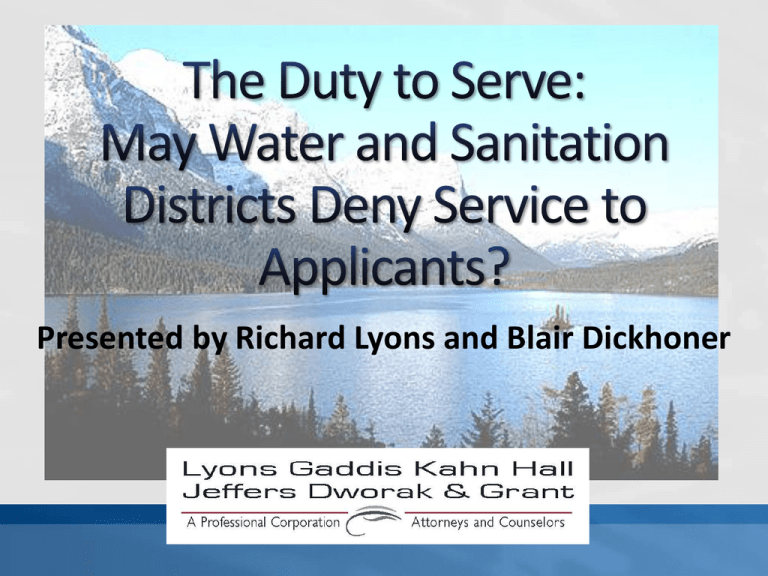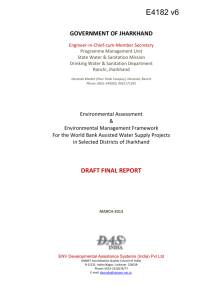The Duty to Serve: When Can Water and Sanitation Districts Deny
advertisement

Presented by Richard Lyons and Blair Dickhoner • Common Law. • Regulatory Requirements. • Contractual Obligations. • Statutory Duties. “It is well settled that parties who carry on a business which is public in its nature, or which is impressed with a public interest, must serve all who apply on equal terms and at reasonable rates.” City of Danville v. Danville Water Co., 53 N.E. 118, 122 (Ill. 1899) Common Law Duty to: Serve. Provide safe and adequate service. NOT discriminate. Charge just and reasonable prices. Good faith and fair dealing. Regulatory Obligation–Public Utility Commissions Many states regulate providers and mandate a duty to serve all. Public has enforceable right to demand service from a public utility. Colorado: water/sanitation district are NOT “public utilities” subject to PUC regulation, Schlarb v. North Suburban Sanitation District. Service Obligations Arising from Contracts A contractual obligation to serve at a long term fixed rate is enforceable against a district , and is not a “surrender of legislative power.” National Food Stores v. No. Washington Street Water & Sanitation District. District can be sued for breach of contract to serve. Alameda Water & Sanitation District v. Ridgewood Mobile Homes Park, Inc. Statutory Services Title 32 defines scope of obligation and exemptions to that duty. §32-1-101, et seq., C.R.S. defines the scope of obligations and exemptions to the common law duties for water and sanitation districts. “…special districts… will serve a public use and will promote the health, safety, property, security, and general welfare of the inhabitants OF SUCH DISTRICTS and of the people of the state.” Service Plan Obligations: Types of service, service area, conditions, and manner of service. Service Area: Not always identical to district boundaries. Enforcement of Service Plan: Plains Metropolitan District v. Ken Caryl Ranch Metropolitan District. Title 32 Implied Duty to Serve - Definitions of Water District and Sanitation District Water district: Uses phrase “for public and private purposes.” Sanitation district: No mention of “public.” Neither uses “shall” or “will” in definition. Title 32 Modifies Common Law Duty to Serve Does NOT mandate service! DOES provide exemptions from duty to serve. §32-1-1006(I)(b)(I), C.R.S. Board may decline service to ≥ 10 acre tracts upon affirmative finding that it is infeasible impractical undesirable to extend lines to such areas. Service Plan May establish which areas are eligible for service or require inclusions. § 32-1-401, C.R.S. District may require inclusion in accordance with statutory procedures. Outside of Boundaries or Service Area No duty to serve outside of the boundaries or service area. Schlarb v. North Suburban Sanitation District Reasonable Conditions A district may establish reasonable conditions that must be met to receive service but those conditions must be related to the district’s statutory powers. The district’s powers are those expressly conferred by legislation or reasonably inferred from the Special District Act. Romer v. Fountain Sanitation. The district cannot use denial of service as a planning, zoning or other land use tool because districts lack these land use powers. “Feasible, practical, desirable” to serve (ad hoc decision)? OR Master utility plan that is kept current (recommended). §32-1-1001(1)(j)(I), C.R.S. – Rate Setting Districts can establish “fees, rates, tolls, penalties or charges for services.” Rate setting is considered a legislative function. Krupp v. Breckenridge Sanitation District. Section 32-1-1001(2)(a), C.R.S. recently passed as HB 13-1186 requires that districts provide notice before fixing or increasing rates or fees but preserves rate setting as a legislative function. §32-1-1006(1)(b), C.R.S., authorizes division of district into areas based on services provided AND to charge differing rates based on those services. Financing Capital Costs District can either finance plant, facilities and infrastructure expenditures through the issuance of bonds (§32-1-1101, C.R.S.) OR District can require the landowner to pay for infrastructure and enter into a reimbursement agreement with that landowner (§32-1-1006(3), C.R.S.) Reasonable Rules and Regulations District can establish reasonable rules or regulations that establish specifications and conditions of service (§32-1-1001(1)(m), C.R.S.) YES, if the applicant cannot or will not meet the district’s reasonable and legal conditions which may include the following: Construction of needed facilities Installation of needed line extension Expansion of existing facility or line capacity Payment of all fees Inclusion (if required) or service by an executed contract is extraterritorial Adherence to all rules/regs/specs, Utility Plan Other utility related reasons NO, if applicant meets all established reasonable utility related conditions or contingencies. Vested Right or Expectation Interest A vested right arises from a transaction or property ownership that is perfected to a degree that is not dependent on statute or common law. Miller v. Branon, citing Ficarra v. Department of Regulatory Agencies. Absent a contract for taps or service, an “expectation” is not an enforceable right. Vested rights may still be subject to reasonable exercise or regulatory “police” powers for the public good. Lakewood Pawnbrokers, Inc. v. City of Lakewood. Regulatory Taking A regulatory taking only occurs if the district’s regulations or decision causes one of the following: The action fails to advance a legitimate district interest. Trailer Haven MHP, LLC v. City of Aurora; Even if reasonable reg, denies owner ALL economically viable use of the property. Animas Valley Sand and Gravel, Inc. v. Bd. of County Comm., or “Fact specific taking” of property (e.g., adverse impact on legitimate “rights”). Hypothetical A tract of land is historically zoned low density residential and as a result, the district’s infrastructure/master plan extends smaller lines to the area. Twenty years later, the land is up-zoned to high density but the district cannot serve this increased density. Is this an expectation interest or a vested right? rlyons@lgkhlaw.com bdickhoner@lgkhlaw.com








